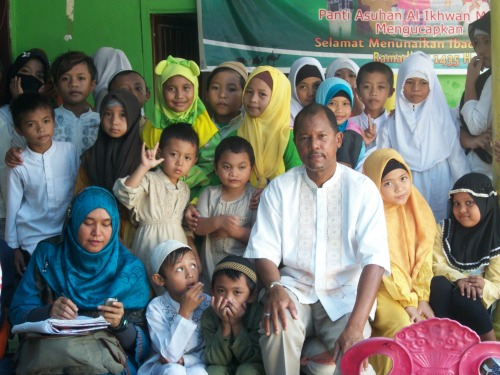
Usually when people go on vacation they visit family and friends, but for the past four years hundreds of orphans in the North Sulawesi province in Indonesia have received love and visits from a Germantown couple. Salahuddeen Abdul Kareem and Irda Nurwahyuni are a couple with big hearts and smiles.
They met on an online marriage website attracted to each other by a mutual respect for family values. She is from Manado, Indonesia, a former radio journalist and he is from Adams Morgan DC, an educator, and former principal of the Muslim Community School.”When I found out that she supports her elderly parents with her meagre income, [I] knew she was [the one],” shares Abdul Kaeem looking at his wife with admiration.
A father of five and grandfather of seven grand children, he visits schools to study their education system in every country he travels to, from Morocco to Saudi Arabia. But schools would be closed in the summers when they visited Nurwahyuni’s mother in Indonesia so they decided to visit orphanages since they are open year round. The first visit was an emotional experience for the couple and they became attached to the children as the years went by.
Now they look after childrens' needs in 10 orphanages, from helping provide matteresses to pot and pans, gathering money from friends and colleagues in the Washington D.C. area. They find the orphanages through hotels and masajid in the areas they visit. “I walked into a masjid and asked anyone who spoke English,” shares Abdul Kareem.
Sr. Anneka runs Panti Asuhan Putri Siti Khadijah orphanage,a seven minute walk uphill from her house. She is exhausted. She inherited the orphanage from her family and runs it with a few volunteers—without pay. Seventy-eight children depend on her for meals, uniforms, shots, everything. Ramadan is a generous month with bags of rice stack up against the orphanage walls, but then the donations dry up. Anneka met the couple when they visited her orphanage and their meeting has kept her spirits up as they were a divine intervention for her selfless but tired efforts. It is a blessing of Allah how He connects the hearts of strangers.
Sometimes parents in the village of tin roofs crammed close together drop off babies because they cannot afford to feed the extra mouth. Orphanages in the province receive only about $3000 from the local government, according to Abdul Kareem. There are around 8,000 orphanages throughout Indonesia, 10 of them run by the central government, 200 by regional governments and the rest by private institutions, according to data from the Social Affairs Ministry.
Bringing a change in the crippling orphan culture is their main target. “We want to infuse independence, especially for the girls and break that cycle of helplessness,” says Nurwahyuni.
Other advocates in Indonesia have also been demanding the government provide benefits to orphans. Eti Nurbaeti, the treasurer at the Putra Nusa home, said in an interview with the Jakarta Globe that they have been asking the Jakarta government to provide jobs for the children after they finish vocational school, but their requests were ignored.
Softspoken Nurwahyuni says the love she receives from the orphans keeps taking her back. They roll around, climb on her back, pull her cheeks and give her tight hugs. Who would not want that kind of love she asks herself. They go back to the same orphans every year to check up on the children.
The Prophet Sallallahu 'alyhi wa sallam, an orphan, changed the world. He lived and breathed these realities, the loneliness, the deprivation. “I tell the children that they have the potential to walk in the footstep of the Prophet and become leaders with empathy because they have lived the life and feel the humanitarian pulse,” says Abdul Kareem. An orphanage is an investment in the Ummah, in his eyes.
An application is pending for non-profit status for Kindness & Care Beyond Borders, the charity the couple founded. They hope to make Indonesia a base and spend more time developing the orphan program.
On their last trip they interviewed and sent two young women to college. “The donations my wife and I received from many caring brothers and sisters, helped pay for these girls college registration fee, one year tuition, and flight to Makassar, Indonesia where the college is located,” wrote Abdul Kareem in a note to his benefactors. “I tried my best to share this unfolding story and other information related to the orphan-support effort that was entrusted to our care from our Muslim brothers, sisters, and friends here in America.”
“If we return to Indonesia next summer, we hope to find out how these girls performed academically in college. If we have the funds, we will make a further donation to their college program of students,” said Abdul Kareem.